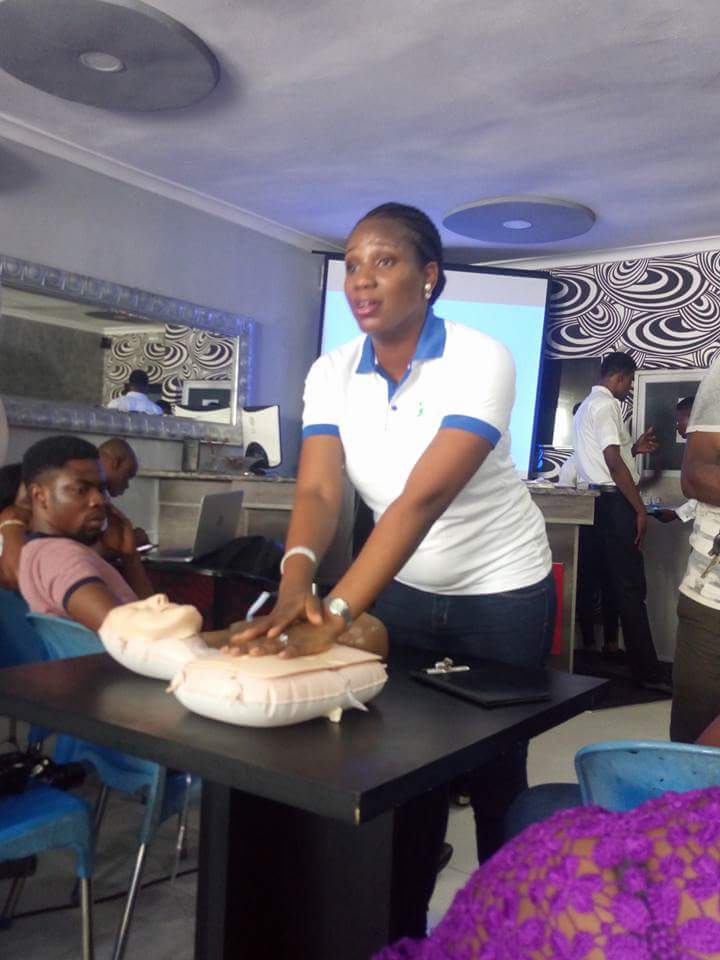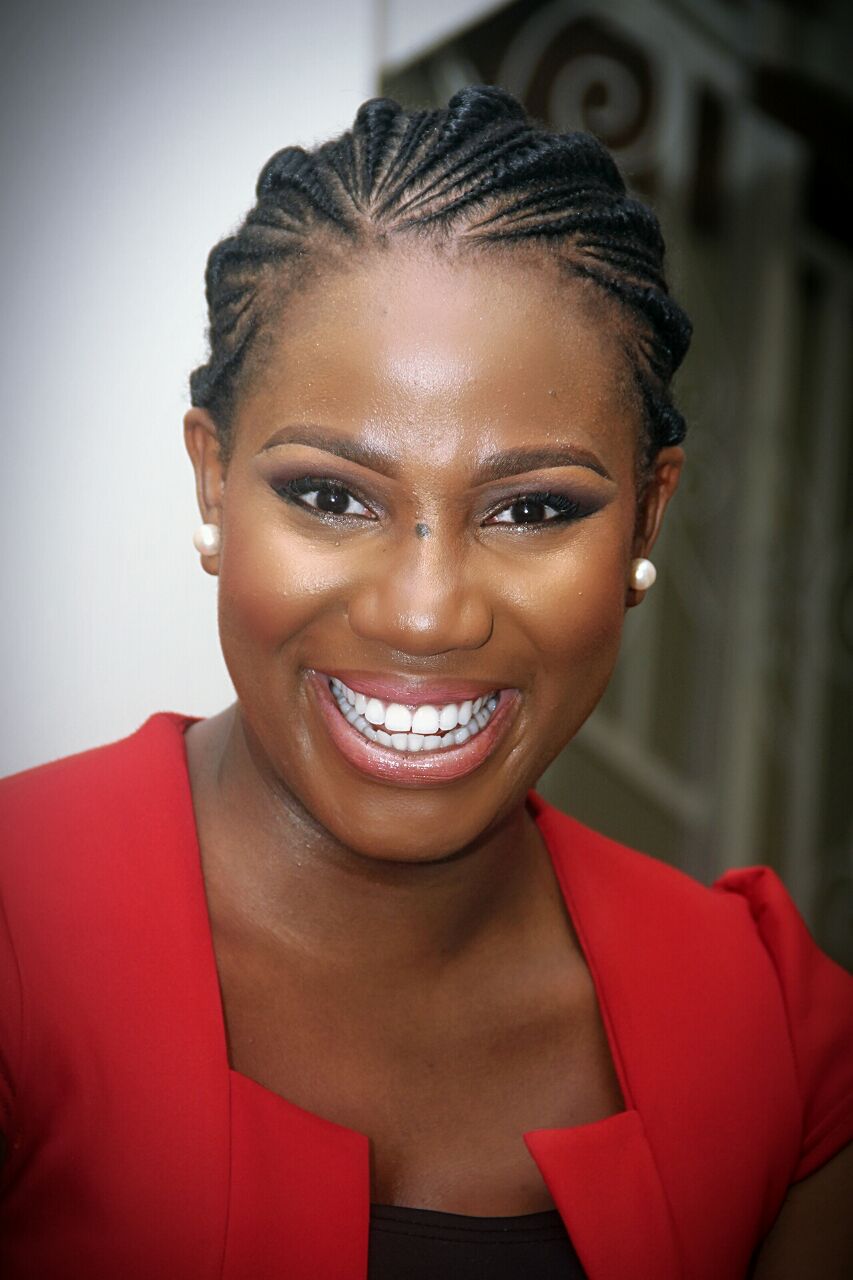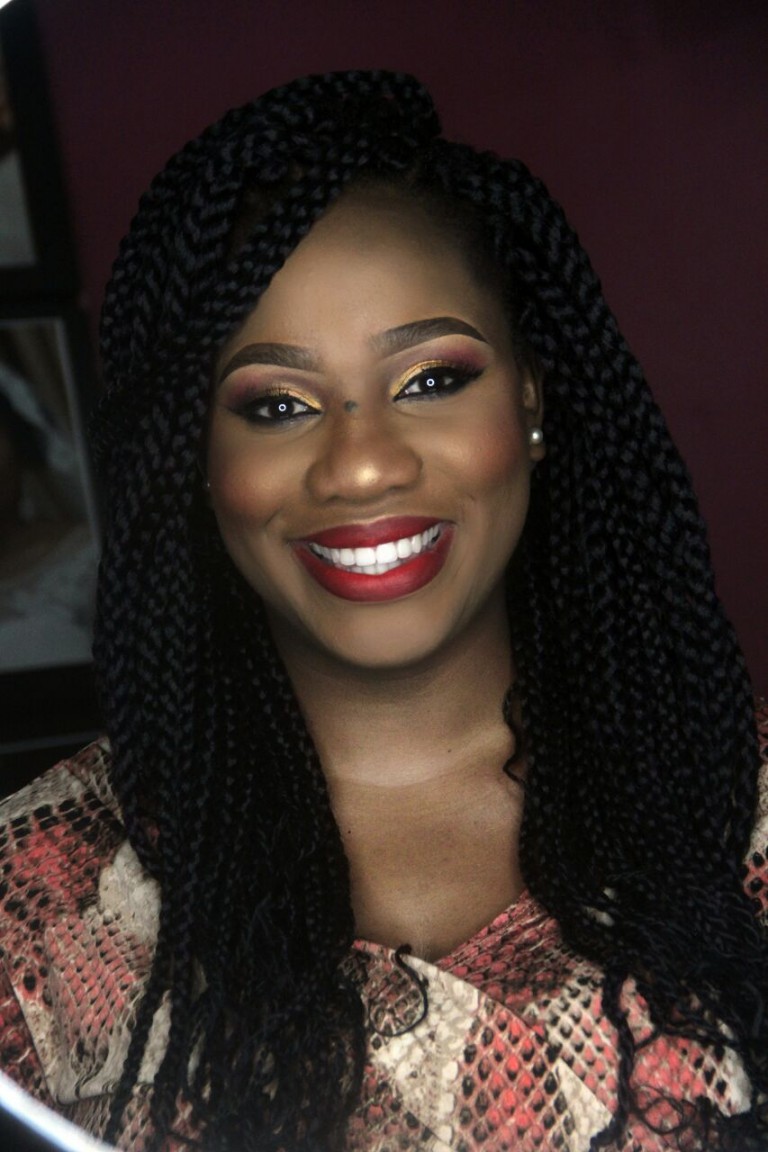Ajimegor is a medical doctor, and public health professional with a special focus on Early Childhood Development . She always felt quite limited by the clinical practice of medicine in Nigeria, which conceived her passion to do whatever she can to make sure that every child (no matter the socio-economic status of family, or circumstances of birth), is given an equal opportunity to reach his/her full developmental potential She has been actively involved in health care, community service and development for over a decade and founded Lead Oak Women and Children Foundation, an NGO, where she leads a dynamic team to initiate, design and execute programs that tackle ECD related issues in Nigeria. Most recently selected as a 2017 Mandela Washington fellow, she shares her story in this interview.
Growing up in a large family
Growing up for me was very interesting, as my family was very large, multifaceted and fascinating. I was surrounded by much older adults who were all strong, often spirited, each extraordinary in their own way. As I look back however, two people stand out for me, in terms of shaping this woman that I am today; my mother, and my immediate elder sister.
My mother taught me to give of myself and my substance, to give and keep giving, even when you think you don’t have any more to give. I remember from a very young age that she would make us give out our nice clothes and other stuff which were no longer our size to people who could not afford to buy such for themselves. To celebrate festivities, she would often make us cook and join her in distributing food to homeless, disabled people. She was also a major influence in my decision to study medicine. She is a retired nurse and midwife herself, and at the time I was growing up, she ran a standard maternity home and was very passionate about the health of women and their babies. She became a national treasurer for NANNM (National Association of Nigeria Nurses and Midwives), as well as a project co-ordinator for a John Snow International ‘Family Planning’ program. I read all her medical books, even though I could not understand most of what was in it, and as I grew older, I became her non-medical assistant. I loved every bit of it! Naturally, there seemed to be no other career suitable for me than medicine, when it was time to choose.
In retrospect, I can see that my childhood did prepare me for what I do now. Even though the experience was sometimes unpalatable, it was definitely worth it!
Meet Me
My name is Ajimegor Ikuenobe, I am a Christian, a wife, and a mother. I am also a medical doctor, and public health professional with a special focus on Early Childhood Development.
I have been actively involved in health care, community service and development for over a decade. I am the founder/executive director of Lead Oak Women and Children Foundation, an NGO, where I lead a dynamic team to initiate, design and execute initiatives that tackle issues surrounding ECD in Nigeria. Our programs have reached hundreds of vulnerable children and their mothers, providing nutritional, health, and educational support to the children, while building the capacity of their mothers to help them become self-reliant in a sustainable way.
I am also the co- founder of Convergence for Early Childhood Development in Africa (CECD Africa), a social enterprise promoting sustainable development and national progress through ECD programs; as well as the convener of the parental support workshop, ‘ECD FOR MUMS’, which was launched in the first quarter of this year in Lagos, Nigeria.
Most recently, I was selected by the U.S. State Department’s Young African Leaders Initiative (YALI) as a 2017 Mandela Washington Fellow.
I have always felt quite limited by the clinical practice of medicine in Nigeria, so my passion to do things more effectively, as I pursue my life’s purpose has led me down my unique path. I envision a world where every child (no matter the socio-economic status of family, or circumstances of birth), is given an equal opportunity to reach full developmental potential in life. Consequently, I have been actively engaging the hurdles confronting the Nigerian child today.
I am committed to challenging ineffective stereotypes and developing innovative, homegrown solutions to global health issues which are pragmatic and effective in the African context.
I have the privilege of being married to my teacher and mentor, and together we are blessed with three children.

Lead oak women and children organisation
As founder/executive director of Lead Oak Women and Children Organisation, I am responsible for creating and imparting the vision and mission of the organisation to all team members as well as the overall project coordination of the organisation’s Integrated Early Childhood Development Program. Our projects have reached hundreds of less privileged women and vulnerable children under five (5) years of age in Nigeria.I provide oversight function in the sustained implementation of the ‘Feed a Child’ project where children under five years of age are registered to receive ‘Nutrimeal’ (a specially formulated blend of maize, soya beans, and groundnuts for high impact nutrition) on a weekly basis with routine medical screening for the period of one year. The project has helped many vulnerable children receive free medical treatment, have their births registered, and vaccinated in response to the weekly health education programs.
Inspiration behind my work
I am consistently driven by a strong, insatiable, desire to fulfil the specific purpose for which I was created, and execute the assignment for which I am on earth. That is what keeps me going. I want my life here to count, to make a positive impact in the world around me, and leave this planet better than I met it, creating a better future for our children. This is what gets me up in the morning.
I started Lead Oak Foundation during my National Youth Service Program(NYSC). I worked as a medical officer in a primary health care centre in a semi-urban area of Edo State. I had no plans of starting a Non-Governmental Organisation (NGO) at the time, but I kept seeing alarming cases of malnutrition and its complications in very young children in the community where I worked. On further research, I found out that most of them were from families often without a source of income, no education, and no decent homes to live in. There were scores of uncompleted buildings in the locality where they lived with no doors, windows, or electricity. They literally felt that they had no hope for life and no reason to believe in a better future for their children. It was such a sad situation to see children with so much promise and potential waste away just because they were born into that kind of environment. They did not choose where or how to be born.
It became quite clear to me, after some time, that I needed to step up and do something about it. Something beyond the normal scope of my job and medical practice. I had to, in a sense attempt to be the solution! After accepting this challenge, I was also able to rally people around the vision that I saw and how we were going to achieve it.
With God’s help, I got so many amazing people to partner with me to begin this journey that I was humbled! Passionate volunteers, individuals and organisations supported this cause wholeheartedly. It would not have been possible without that kind of support.
Impact of Convergence for Early Childhood Development in Africa (CECD Africa)
CECD Africa is a social enterprise which I co-founded with my husband. It exists to promote sustainable development and national progress through Early Childhood development (ECD) programs. It serves as a backbone organisation in integrating multiple stakeholders using a collective impact approach, while leveraging on research and indigenous knowledge to provide solutions to ECD challenges. I lead our team to build solutions around issues plaguing Early Childhood Development in Nigeria.
CECD Africa organizes a series of parental knowledge and support workshops; ‘ECD FOR MUMS’ which was launched in Lagos, on the 1st of April 2017.These workshops are designed to be one-day learning get-away to exchange knowledge, share experience and improve the performance of parents & caregivers in the process of nurturing children to develop and reach full developmental potential. The program includes presentations by highly skilled ECD experts, it also includes lively, engaging interactive sessions where participants can freely ask questions and share their challenges in a relaxed, cosy, informal environment. They will be provided with critical, lifesaving knowledge and skills communicated in simple, clear terms which they can easily translate to lifestyle changes. This will in turn ensure maximum, sustainable impact on the life and well-being of their children, and ultimately, guarantee the growth & progress of our nation.
Reward
Results! The satisfaction of seeing actual change in the lives of people because of our initiatives, is greatly rewarding! When I see children, who were malnourished and sickly, metamorphose into strong healthy children, who can go to school, with their families now equipped with both the knowledge and source of income to help them thrive, and not just survive; It’s a reward that’s greater than any monetary remuneration.
Challenges
Some of the major challenges I have encountered include existing stereotypes, unfavourable cultural norms and outright resignation on the part of most people and communities to the prevalent situation around them. One of the most important elements necessary to bring about any kind of change is a mind-set change. I have continued to confront this head-on through persistent advocacy, rekindling hope and the ‘can-do’ attitude of the people in the communities where we work. In addition, the application of innovative solutions to constantly identify and fill the existing gaps have been invaluable in overcoming these challenges.
Projects and activities
ECD is an acronym for Early Childhood Development referring to the period from conception through birth to eight (8) years of age which is very critical to the cognitive, emotional, social and physical development of a child. It is in a sense a ‘make or break’ period in the life of every individual. My projects and activities are all centred around designing and executing programs targeted at addressing the challenges confronting ECD in my country. The objective of these programs is to ensure that every child has an equal opportunity to reach full developmental potential, and grow up to become productive members of society, being the very best they can be.
These initiatives, most of which I have previously highlighted, include:
The ‘Feed a Child’, ‘Equip a Mother’, and ‘Educate a Child’ Initiatives which make up our Integrated Early Childhood Development Program targeted at vulnerable children and their mothers.

Giving Up
Most definitely! I think everyone who has ever dared challenge the status quo, in a bid to improving their world will encounter seemingly overwhelming challenges that make you want to throw in the towel, on a regular basis. What separates those who keep engaging from those who give up, is simply the decision to keep moving; to rise above the challenges and continue to make head way in the direction of your goals.
Personally, my belief in God is my main stay at such times. My God-given assignment is too important to give up. When I think about the purpose for which I was created, the impact I am designed to make, and the sheer number of people whose lives literally depend on the work that I am involved in; I simply must keep moving. I do not have much of a choice about this. It is a cause much greater than I.
View on early childhood development in the Nigerian context
To answer this question correctly, please allow me to paint a picture of our current situation as it relates to ECD in Nigeria, based on facts;
According to UNICEF, Nigeria currently ranks low on most of the early childhood development indices in comparison with other countries worldwide: 2,300 children aged 5 years and below as well as 145 women of child bearing age die every single day (this makes Nigeria the second largest contributor to under-5 mortality and maternal mortality worldwide). 41% of children under five (5) years are stunted. Less than 20% of children under five (5) have access to any form of childcare programs or preschool education, with a 14% pre-primary enrolment rate. Birth registration is still less than 30%.
In addition, we have more young children being exposed to sustained toxic stress, due to violence, displacement from their homes, loss of their parents, and hunger, among so many other things. They are at risk, now more than ever due to the insurgency in some parts of the North. Consequently, we observe a further worsening of what was already alarming, with regards to our ECD indicators. As Anthony Lake, ED UNICEF put it aptly referring to plight of the children in north-eastern Nigeria, ”What is already a crisis can become a catastrophe!”
A lot of work has been done, and is still being done, but this is an emergency on our hands and all relevant stakeholders will need to come together to collaborate, to make the kind of aggressive progress needed to salvage this situation. We need to be more daring and innovative to design ECD policies and programs, working together nation-wide, to determine what is actually effective in our present context. As it is, we cannot afford to make the usual ‘steady progress’! We must leap-frog our progress in this area to cope with the present challenges confronting ECD in Nigeria.
Too many of us are working in isolation. To greatly improve impact and sustainability, we must build all-inclusive stakeholder platform, using a collective impact approach to address challenges surrounding Early Childhood Development in Nigeria, and Africa at large.
If we do not, by 2030 when Nigeria is predicted to double in population, we will have an alarming number of adults who cannot be productive members of society, hence they will either be totally dependent for survival, or negative elements who are easy targets for perpetrators of terrorism and violence.
We must equip our children to thrive and not just survive. They are the future of any nation.
Being a woman of rubies
In all honesty, I must say I am just a woman in pursuit of purpose. If in doing that, some aspect of my story can inspire someone else to believe that they can be their best self yet, step out of their comfort zone, and overcome obstacles to make a positive difference in our world; then, I will be honoured to be a woman of rubies.
Final words for women
Pursue purpose – What is that thing that gets your juices flowing, that makes you very angry to observe or very excited to do? What is it you would do if you have no fear whatsoever? Something you would gladly do for free, or better still even pay someone to allow you to do it? Examine it carefully, because your purpose is in that vicinity. I believe were all made for a purpose. Find yours and pursue it with all that you have got!
Set your priorities right -This is very important especially as women, because we often find ourselves juggling so many balls at the same time. Trust me, Life does not have to be so complicated! Have an honest conversation with yourself and articulate what really means the most to you, in order of importance. Write it down. Each time a choice confronts you, simply make a choice based on your current priorities, until they change, then you can adjust them. There are different seasons in a woman’s life. Be sensitive to this and let your choices reflect them.
Live deliberately – Make every day count. Decide how you want your life to be and begin to create it, even when it seems like such a long shot. Let all your little, day to day choices add up to the future you want to live.
Compete against your best self ONLY – You are not in competition with anyone. In this world, you have no mates! Be a life-long learner, daily seeking to become the best you that you have the potential to be; for yourself, your world and your God.


